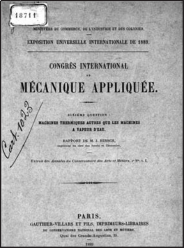- HIRSCH
- FRANCE (see also List of Individuals)\
 22.5.1836 Lyon/F - 21.6.1901 Paris/F\Joseph Hirsch graduated from Ecole Polytechnique in 1855 and from Ecole des Ponts et Chaussées in 1860. He undertook professional tours to French neighbor countries to study the development of steam machinery. From 1861 to 1867 he was posted in the French mining center Sarrebourg to design a siphon for a navigation canal for coal transportation. His design worked automatically and was presented at the 1867 Universal Exhibition. Next, he moved to Lyon where being involved in the Barbe Dam on Saône River. Following personal problems in the Corps, Hirsch concluded his engineering career in Lyon to devote himself to science.\From 1869, Hirsch was associated with his father-in-law, an industrialist in the North of France working in the steel industry. Yet, the Franco-Prussian War put an end to all activities. Hirsch thus started to work in steam machinery, his preoccupation until the end. In Paris, he was allowed to conduct experiments with his design proposal and in parallel established a theory for thermal machinery. His 1874 paper was awarded the Gold Medal and marked a step to future: He was appointed professor of thermodynamics at Ecole des Ponts et Chaussées in 1876, from where he retired 22 years later. A second successful book followed in 1878 which made Hirsch to the most renowned French scientist in thermodynamics of the time. Hirsch was in addition a specialist in boilers, of which many exploded with accidents that proved the need of knowledge for design standards to be adopted in practice. His 1885 book on steam machines may be considered a definite work on the then most widely used machinery, from railroad locomotives to industries for power production. In parallel, Hirsch continued also with hydraulic projects presented for instance during the 1886 Vienna Navigation Congress.\Chatzis, K. (1994). Joseph Hirsch. Les professeurs du CNAM 1: 665-673. CNAM: Paris. Fontanon, C., Grelon, A., eds. (1994). Joseph Hirsch. Les professeurs du Conservatoire National des Arts et Métiers: 665-673. CNAM: Paris.Hirsch, J. (1869). Note sur le réservoir de Mittersheim et le déversoir-siphon. Annales des Ponts et Chaussées 39(1): 218-239.Hirsch, J. (1874). Théories des machines aérothermiques. Annales des Ponts et Chaussées34(1): 409-528; 35(2): 370-374.Hirsch, J. (1878). Cours de machines à vapeur et locomotives. Gauthier-Villars: Paris. Hirsch, J. (1881). Les élévateurs et plans inclinés pour canaux. Imprimerie Nationale: Paris. Hirsch, J., Debize, A. (1885). Leçons sur les machines à vapeur. Dunod: Paris.
22.5.1836 Lyon/F - 21.6.1901 Paris/F\Joseph Hirsch graduated from Ecole Polytechnique in 1855 and from Ecole des Ponts et Chaussées in 1860. He undertook professional tours to French neighbor countries to study the development of steam machinery. From 1861 to 1867 he was posted in the French mining center Sarrebourg to design a siphon for a navigation canal for coal transportation. His design worked automatically and was presented at the 1867 Universal Exhibition. Next, he moved to Lyon where being involved in the Barbe Dam on Saône River. Following personal problems in the Corps, Hirsch concluded his engineering career in Lyon to devote himself to science.\From 1869, Hirsch was associated with his father-in-law, an industrialist in the North of France working in the steel industry. Yet, the Franco-Prussian War put an end to all activities. Hirsch thus started to work in steam machinery, his preoccupation until the end. In Paris, he was allowed to conduct experiments with his design proposal and in parallel established a theory for thermal machinery. His 1874 paper was awarded the Gold Medal and marked a step to future: He was appointed professor of thermodynamics at Ecole des Ponts et Chaussées in 1876, from where he retired 22 years later. A second successful book followed in 1878 which made Hirsch to the most renowned French scientist in thermodynamics of the time. Hirsch was in addition a specialist in boilers, of which many exploded with accidents that proved the need of knowledge for design standards to be adopted in practice. His 1885 book on steam machines may be considered a definite work on the then most widely used machinery, from railroad locomotives to industries for power production. In parallel, Hirsch continued also with hydraulic projects presented for instance during the 1886 Vienna Navigation Congress.\Chatzis, K. (1994). Joseph Hirsch. Les professeurs du CNAM 1: 665-673. CNAM: Paris. Fontanon, C., Grelon, A., eds. (1994). Joseph Hirsch. Les professeurs du Conservatoire National des Arts et Métiers: 665-673. CNAM: Paris.Hirsch, J. (1869). Note sur le réservoir de Mittersheim et le déversoir-siphon. Annales des Ponts et Chaussées 39(1): 218-239.Hirsch, J. (1874). Théories des machines aérothermiques. Annales des Ponts et Chaussées34(1): 409-528; 35(2): 370-374.Hirsch, J. (1878). Cours de machines à vapeur et locomotives. Gauthier-Villars: Paris. Hirsch, J. (1881). Les élévateurs et plans inclinés pour canaux. Imprimerie Nationale: Paris. Hirsch, J., Debize, A. (1885). Leçons sur les machines à vapeur. Dunod: Paris.
Hydraulicians in Europe 1800-2000 . 2013.
